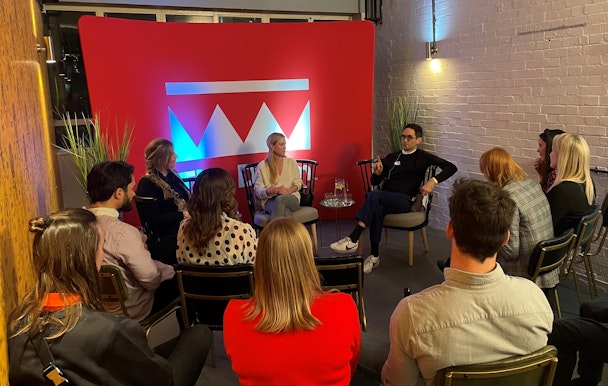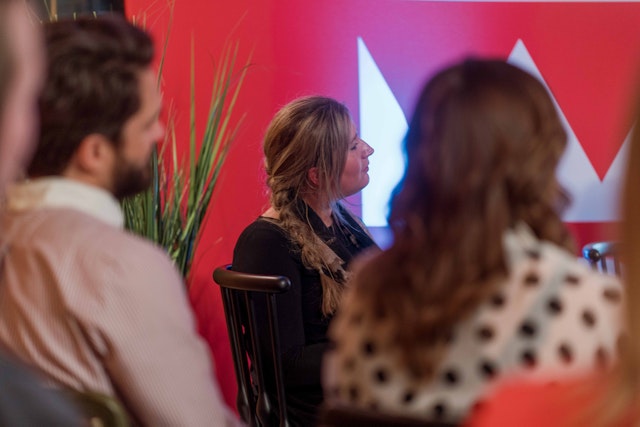Crumbling cookies, brand purpose and bringing ‘humanity back to marketing'
Brands need to be authentic, show up with purpose and invest in social and regenerative capitalism. And it’s up to the next generation of marketers to promote environmental, social and governance (ESG) in their brands, be that through digital marketing and local experiences at the grassroots.

Marketing Innovation Lab community meet up tackled the biggest trends in marketing today
Following a year of workshops, the ‘Meet Your Marketing Hero’ series and Slack takeovers from Pret, Ace & Tate, and Made.com, the Future 50 Marketing Innovation Lab community finally got to meet in-person at an event hosted at The Drum Labs.
Attendees were joined by Jessica McGrogan, senior director of business development (brand) at The Trade Desk, and Rupert Leigh, creator and chief executive of Jackpot Peanut Butter, who shared their take on the hottest ‘trends’ in marketing today. The informal, interactive session invited members of the community to vote ‘hot or not’ on each of the trends, sparking a lively debate among attendees.

Stop calling them consumers
“Authenticity is not a trend per-se, it should always be how you communicate to customers. A customer will forgive when you ask and support when needed,” said Leigh, on the topic of authenticity, which garnered most votes from the community. “Oh, and they are people, they have their own purpose. Stop calling them consumers.”
Not all brands have the history or the budgets to work with ‘celebrities’ and so should look at aligning and creating a local ambassador program that develops your reputation with authenticity, Leigh advised, citing examples from In N Out, Patagonia and Vans. “By creating memorable local experiences that don’t just look at scale but your reputation on supporting the ‘underdog’ shows you have authentic values that underpins a customer – not consumer – strategy.”
This led on to Leigh’s next trend: ESG initiatives. He spoke of ‘regeneration capitalism’ and ‘regenerative sustainability’ – a design philosophy that preaches a better lifestyle through improving as many physical systems around us as humanly possible so that we leave them better than we found them. He highlighted reusable and recyclable LEGO bricks, and Huit Jeans’ ‘No Wash Club’ which urges people to not wash their jeans for a minimum of six months.
Creating something better
McGrogan complemented Leigh’s sentiments with a spotlight on some of the hot topics in the digital marketing world – including identity, connected TV and retail media.
With lots of conversations happening in the identity space, McGrogan noted how we’ve got over the period of panic brought about by the pending disposal of third-party cookies. Things are starting to settle now, she says, as brand advertisers, agencies and publishers look to a brighter future.
“From recent conversations, it’s clear that agencies, publishers and brands are excited about the new landscape that identity is going to play in,” she said. “Cookies were never really fit for purpose but it’s what we had at our disposal. But now there’s a big opportunity to create something better which threads the needle between targeting, personalization and privacy for the consumer.”
She spoke of how brand marketers are really looking to their partners for help in this space, because, historically, they have been “a little more far removed from the people that are building the tech and the identity solutions”. But now with more working groups in place and a renewed focus on the value exchange of advertising on the open internet, we’re doing “a better job collectively at discussing that”.
McGrogan also touched on one of the hottest topics in the advertising world: retail media – which is opening new opportunities for advertisers to create ‘closed loop’ attribution that ties ad engagements through media campaigns back to real sales. This $100bn media opportunity for retailers fills the void of personalization through access to retailers’ first-party data – making it a compelling new channel for advertisers to start exploring right now.
“Retailers have been using loyalty cards – like Tesco’s Clubcard which launched in 1995 – to develop their customer data for many years," said McGrogan. “These insights provide a huge opportunity for advertisers to activate their data alongside the retailers’ – allowing them to identify and reach important new customers. Plus they offer the elusive ability to join online with offline – the holy grail for many marketers.”
A future driven by culture
The discussion also touched on the themes of transparency and the value of a personalized ad and personalized content, “not to confuse with algorithm (intrusive) marketing”, said Leigh.
He added: “On every website, as a ‘customer’, we’re constantly being sold sold sold, asked to consume consume consume, but where does it stop? Where do you draw the line? You have intuition so use it, appropriate your digital strategy with care, there is always another app in development. The prediction of our future predominately comes from culture.”
This discussion took place as part of the Marketing Innovation Lab Community Meetup – a dedicated community made up of The Drum’s Future 50, powered by The Trade Desk.
Content created with:

The Trade Desk
The Trade Desk™ is a global technology company that empowers buyers of advertising. Through its self-service, cloud-based platform, ad buyers can create, manage,...
Find out more
